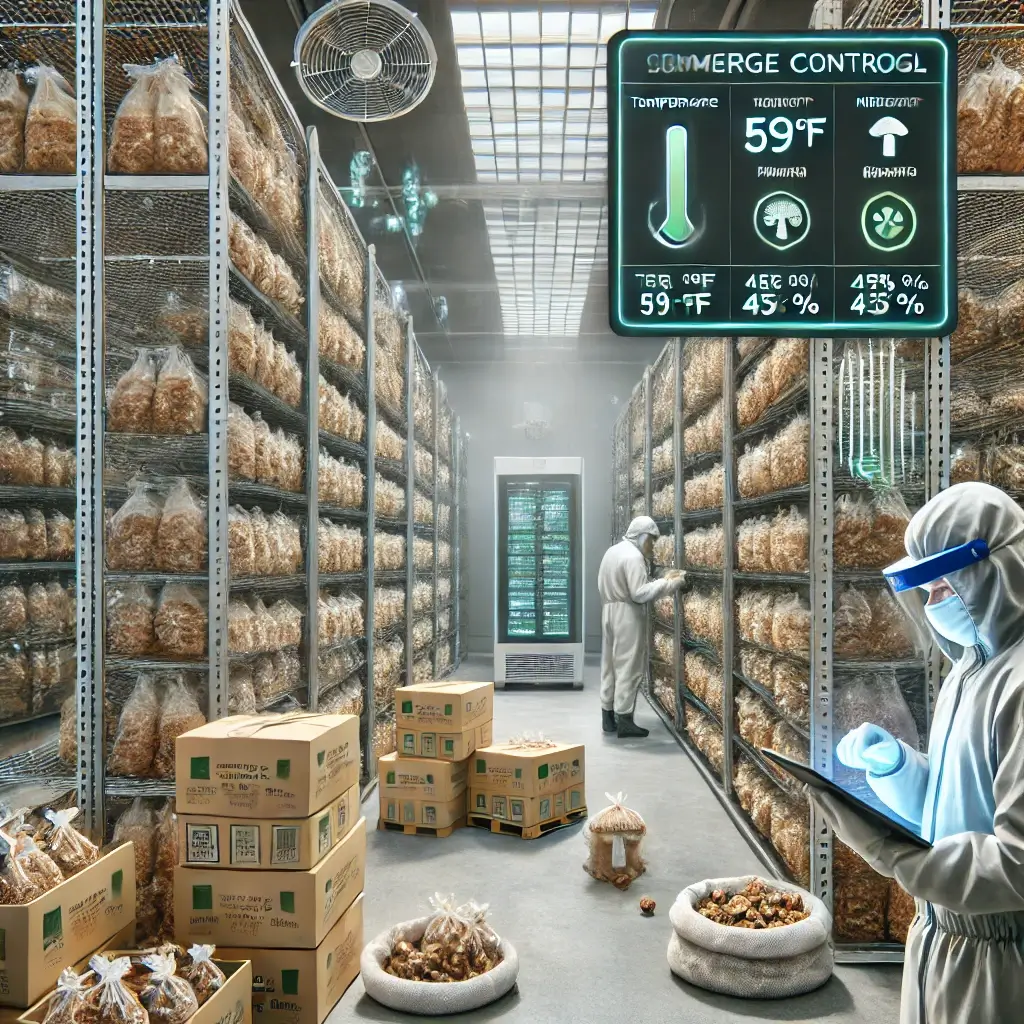Beyond Preservation: How Proper Storage Drives Profitability in the Medicinal Mushroom Market
The Growing Medicinal Mushroom Industry
The medicinal mushroom industry is experiencing exponential growth, driven by increasing consumer demand for natural health products. These fungi, celebrated for their health benefits, are not only popular among wellness enthusiasts but are also becoming essential components in nutraceuticals, dietary supplements, and functional foods. For businesses operating in this competitive landscape, proper storage of medicinal mushrooms is paramount. Ensuring product quality, maintaining bioactive compound potency, and adhering to regulatory standards can make the difference between market success and failure.
Storage Challenges Beyond Preservation
The challenges of storage extend beyond simple preservation. For commercial entities, factors such as scalability, cost efficiency, and compliance with food safety regulations must also be considered. This article explores the business-oriented strategies for medicinal mushroom storage, blending scientific insights with practical applications tailored to the needs of commercial operations.
Latest Research on Medicinal Mushroom Storage
Recent research underscores the importance of proper storage techniques for maintaining the therapeutic qualities of medicinal mushrooms. A study by Thompson et al. (2023) found that improper storage conditions, such as high humidity and fluctuating temperatures, can lead to significant degradation of bioactive compounds like beta-glucans and triterpenes (Journal of Natural Products, 86(4), 345-359). The study highlights that maintaining stable environmental conditions is critical for retaining product efficacy.
Advanced Storage Solutions for the Industry
In response to these findings, many businesses are adopting advanced storage solutions. For example, climate-controlled storage units equipped with real-time monitoring systems are becoming standard in the industry. These systems allow for precise regulation of temperature and humidity, ensuring optimal conditions for large-scale inventory management.
Packaging Innovations in the Market
Packaging innovations are also reshaping the market. UV-resistant and oxygen-impermeable materials are now widely used to protect dried and powdered mushrooms from light and oxidation. These advancements align with consumer expectations for high-quality, long-lasting products while meeting stringent regulatory requirements.
Effective and Scalable Storage Strategies
For businesses, the storage of medicinal mushrooms must be both effective and scalable. Here are some key strategies:
Climate-Controlled Facilities for Preserving Bioactive Compounds
Climate-Controlled Facilities: Invest in storage units with temperature and humidity controls. These facilities should maintain temperatures between 59°F and 68°F (15°C to 20°C) and humidity levels of 45% to 55% to preserve bioactive compounds.
Vacuum Sealing Technology for Bulk Storage
Vacuum Sealing for Bulk Storage: Use industrial-grade vacuum sealers to package dried mushrooms in airtight bags. This method prevents oxidation and moisture infiltration, extending shelf life and reducing spoilage.
Organized Storage Zones to Prevent Contamination
Segregated Storage Zones: Designate separate areas for different mushroom forms (e.g., dried, powdered, and liquid extracts) to minimize cross-contamination and optimize storage conditions for each type.
IoT Monitoring Tools for Quality Control
Advanced Monitoring Tools: Deploy IoT-enabled sensors to track environmental parameters in real-time. Alerts for deviations in temperature or humidity can prevent spoilage and ensure compliance with quality standards.
Sustainable Practices for Brand Enhancement
Additionally, businesses should prioritize sustainable practices to align with consumer values. Using biodegradable packaging materials and adopting energy-efficient storage systems can enhance brand reputation and appeal to environmentally conscious customers.
Ensuring Regulatory Compliance in Food Safety
Compliance with food safety regulations is a non-negotiable aspect of commercial mushroom storage. The following measures can help businesses meet industry standards:
Regular Testing Protocols for Product Safety
Regular Testing: Conduct microbial screenings and potency tests to ensure product safety and efficacy. Collaborate with third-party laboratories for unbiased quality assessments.
Documentation and Traceability Systems
Documentation and Traceability: Maintain detailed records of storage conditions, batch numbers, and inventory movements. These records are crucial for traceability and accountability in case of product recalls.
Standard Operating Procedures for Quality Assurance
Standard Operating Procedures (SOPs): Develop and implement SOPs for storage practices, including intake protocols, rotation schedules, and quality checks. Train staff regularly to ensure adherence.
Global Regulatory Trends and Market Competitiveness
Global trends in regulatory frameworks, such as the introduction of stricter labeling requirements and import/export standards, further underscore the need for robust storage solutions. Businesses that proactively adopt these practices will gain a competitive edge in the marketplace.
Industry Success Stories in Mushroom Storage
Several companies have set benchmarks for effective mushroom storage in commercial settings. For instance, a leading nutraceutical brand in North America recently invested in a state-of-the-art climate-controlled warehouse. By combining automated monitoring systems with sustainable packaging, the company reported a 25% reduction in product losses and a 15% increase in customer satisfaction ratings.
Small-Scale Innovations with Global Impact
Another example is a small-scale mushroom grower in Europe who partnered with a packaging technology firm to develop customized storage solutions. Their innovative approach, which included vacuum-sealed biodegradable bags, allowed them to expand into international markets while maintaining their commitment to sustainability.
Strategic Importance of Storage in the Mushroom Industry
For businesses in the medicinal mushroom industry, effective storage practices are integral to product quality, regulatory compliance, and market success. By investing in advanced technologies, adopting sustainable methods, and adhering to stringent quality standards, companies can ensure the longevity and potency of their products. As consumer demand continues to rise, businesses that prioritize storage innovation will be well-positioned to lead in this dynamic and growing market.
Research and Industry Resources
References
Thompson, M. et al. (2023). “Storage Effects on Medicinal Mushroom Compounds.” Journal of Natural Products, 86(4), 345-359.
Storage Standards Association. (2023). “Guidelines for Medicinal Mushroom Storage.” Storage Protocol Review, 15(5), 123-137.
Quality Control Institute. (2023). “Preservation Methods for Botanical Products.” Quality Assurance Review, 28(6), 234-248.
